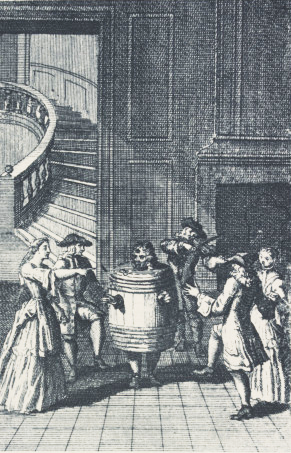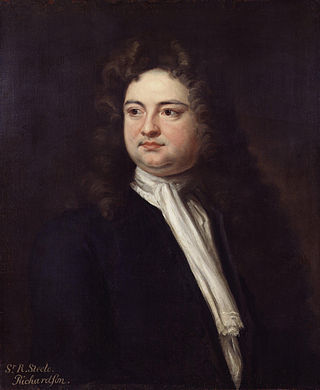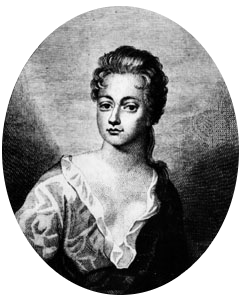
"Restoration comedy" is English comedy written and performed in the Restoration period of 1660–1710. Comedy of manners is used as a synonym for this. After public stage performances were banned for 18 years by the Puritan regime, reopening of the theatres in 1660 marked a renaissance of English drama. Sexually explicit language was encouraged by King Charles II (1660–1685) personally and by the rakish style of his court. Historian George Norman Clark argues:
The best-known fact about the Restoration drama is that it is immoral. The dramatists did not criticize the accepted morality about gambling, drink, love, and pleasure generally, or try, like the dramatists of our own time, to work out their own view of character and conduct. What they did was, according to their respective inclinations, to mock at all restraints. Some were gross, others delicately improper.... The dramatists did not merely say anything they liked: they also intended to glory in it and to shock those who did not like it.

Elizabeth Barry was an English actress of the Restoration period.

Sir Richard Steele was an Anglo-Irish writer, playwright, and politician, remembered as co-founder, with his friend Joseph Addison, of the magazine The Spectator.

Colley Cibber was an English actor-manager, playwright and Poet Laureate. His colourful memoir Apology for the Life of Colley Cibber (1740) describes his life in a personal, anecdotal and even rambling style. He wrote 25 plays for his own company at Drury Lane, half of which were adapted from various sources, which led Robert Lowe and Alexander Pope, among others, to criticise his "miserable mutilation" of "crucified Molière [and] hapless Shakespeare".

The Relapse, or, Virtue in Danger is a Restoration comedy from 1696 written by John Vanbrugh. The play is a sequel to Colley Cibber's Love's Last Shift, or, The Fool in Fashion.
Barton Booth was one of the most famous dramatic actors of the first part of the 18th century.
In English literature, the term comedy of manners describes a genre of realistic, satirical comedy of the Restoration period (1660–1710) that questions and comments upon the manners and social conventions of a greatly sophisticated, artificial society. The satire of fashion, manners, and outlook on life of the social classes, is realised with stock characters, such as the braggart soldier of Ancient Greek comedy, and the fop and the rake of English Restoration comedy. The clever plot of a comedy of manners is secondary to the social commentary thematically presented through the witty dialogue of the characters, e.g. The Importance of Being Earnest (1895), by Oscar Wilde, which satirises the sexual hypocrisies of Victorian morality.

In March 1698, Jeremy Collier published his anti-theatre pamphlet, A Short View of the Immorality and Profaneness of the English Stage; in the pamphlet, Collier attacks a number of playwrights: William Wycherley, John Dryden, William Congreve, John Vanbrugh, and Thomas D'Urfey. Collier attacks rather recent, rather popular comedies from the London stage; he accuses the playwrights of profanity, blasphemy, indecency, and undermining public morality through the sympathetic depiction of vice.

Anne Bracegirdle was an English actress.

Love's Last Shift, or The Fool in Fashion is an English Restoration comedy by Colley Cibber from 1696. The play is regarded as an early herald of a shift in audience tastes away from the intellectualism and sexual frankness of Restoration comedy and towards the conservative certainties and gender role backlash of sentimental comedy. It is often described as "opportunistic" (Hume), containing as it does something for everybody: daring Restoration comedy sex scenes, sentimental reconciliations, and broad farce.
Comédie larmoyante was a genre of French drama of the 18th century. In this type of sentimental comedy, the impending tragedy was resolved at the end, amid reconciliations and floods of tears. Plays of this genre that ended unhappily nevertheless allowed the audience to see that a "moral triumph" had been earned for the suffering heroes and heroines.

Augustan drama can refer to the dramas of Ancient Rome during the reign of Caesar Augustus, but it most commonly refers to the plays of Great Britain in the early 18th century, a subset of 18th-century Augustan literature. King George I referred to himself as "Augustus," and the poets of the era took this reference as apropos, as the literature of Rome during Augustus moved from historical and didactic poetry to the poetry of highly finished and sophisticated epics and satire.

Comedy is a genre of dramatic performance having a light or humorous tone that depicts amusing incidents and in which the characters ultimately triumph over adversity. For ancient Greeks and Romans, a comedy was a stage-play with a happy ending. In the Middle Ages, the term expanded to include narrative poems with happy endings and a lighter tone. In this sense Dante used the term in the title of his poem, the Divine Comedy.

Comedy is a genre of fiction that consists of discourses or works intended to be humorous or amusing by inducing laughter, especially in theatre, film, stand-up comedy, television, radio, books, or any other entertainment medium. The term originated in ancient Greece: In Athenian democracy, the public opinion of voters was influenced by political satire performed by comic poets in theaters. The theatrical genre of Greek comedy can be described as a dramatic performance pitting two groups, ages, genders, or societies against each other in an amusing agon or conflict. Northrop Frye depicted these two opposing sides as a "Society of Youth" and a "Society of the Old". A revised view characterizes the essential agon of comedy as a struggle between a relatively powerless youth and the societal conventions posing obstacles to his hopes. In this struggle, the youth then becomes constrained by his lack of social authority, and is left with little choice but to resort to ruses which engender dramatic irony, which provokes laughter.

Love in Several Masques is a play by Henry Fielding that was first performed on 16 February 1728 at the Theatre Royal, Drury Lane. The moderately received play comically depicts three lovers trying to pursue their individual beloveds. The beloveds require their lovers to meet their various demands, which serves as a means for Fielding to introduce his personal feelings on morality and virtue. In addition, Fielding introduces criticism of women and society in general.
The Conscious Lovers is a sentimental comedy written in five acts by the Irish author Richard Steele. The Conscious Lovers appeared on stage on 7 November 1722, at Theatre Royal, Drury Lane and was an immediate success, with an initial run of eighteen consecutive nights.

A play is a form of drama that primarily consists of dialogue between characters and is intended for theatrical performance rather than mere reading. The creator of a play is known as a playwright.
John Mills (c.1670–1736) was a British stage actor. A long-standing part of the Drury Lane company from 1695 until his death, he appeared in both comedies and tragedies. His wife Margaret Mills was an actress, and his son William Mills also became an actor at Drury Lane.
Jane Cibber was a British stage actress.
The Lying Lover; Or, The Lady's Friendship is a 1703 comedy play by the Irish writer Richard Steele. It was his second play, written while he was an army office doing garrison duty in Harwich during the War of the Spanish Succession. It is described as being both a restoration comedy and a sentimental comedy, and marked the transition between the two.














